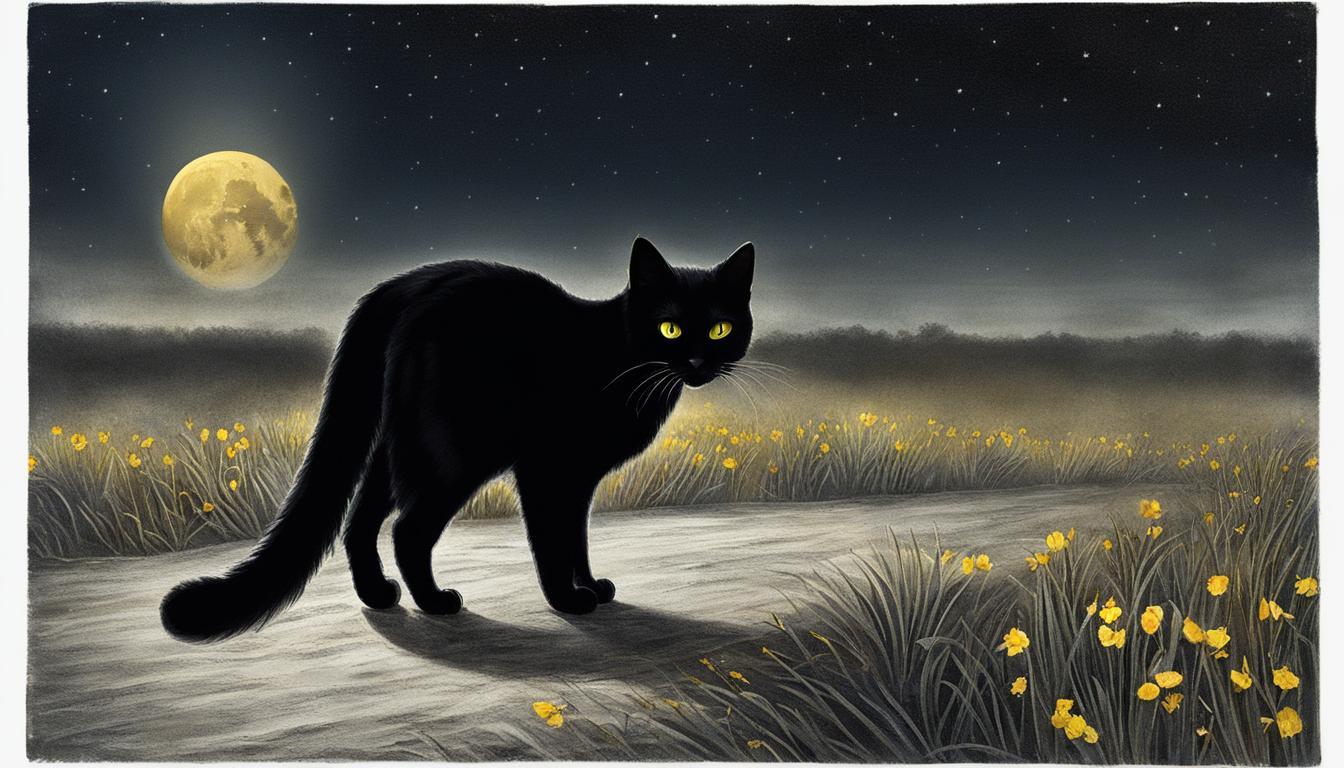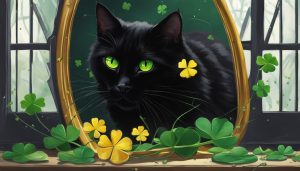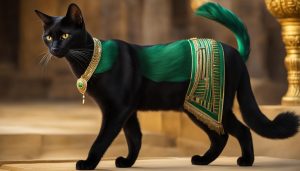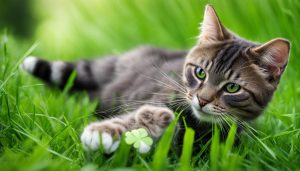Have you ever wondered whether crossing paths with a black cat brings good or bad luck? The superstitions and beliefs surrounding these mysterious creatures have varied throughout history and across different cultures.
While some consider it a sign of misfortune, others believe it brings prosperity. Let’s delve into the fascinating world of black cat superstitions and explore the diverse beliefs associated with them.
Contents
- 1 Origins of Black Cat Superstitions
- 2 Cats Blamed for Spreading the Plague
- 3 Black Cat Superstitions
- 4 Conclusion
- 5 FAQs
- 5.1 Is it true that black cats are considered bad luck in some cultures?
- 5.2 Are black cats seen as lucky in any culture?
- 5.3 Why are black cats associated with Halloween and witchcraft?
- 5.4 What is the origin of the belief that black cats bring bad luck?
- 5.5 Were black cats blamed for spreading the Bubonic plague?
- 5.6 What are some other superstitions and beliefs surrounding black cats?
- 5.7 How many breeds of black cats are there?
- 5.8 Can the coat color of black cats change?
- 5.9 Do black cats have any unique genetic traits?
- 5.10 What is the conclusion about the luck associated with black cats?
- 6 Source Links
Key Takeaways:
- Cultural beliefs and traditions heavily influence the association between black cats and luck.
- In some cultures, encountering a black cat is seen as a symbol of good luck and prosperity.
- The origins of black cat superstitions can be traced back to ancient civilizations and myths.
- Black cats were blamed for spreading the plague during the Middle Ages, leading to widespread fear and superstition.
- There are various breeds of black cats with unique characteristics, such as coat color changes and disease resistance.
Origins of Black Cat Superstitions
The association between black cats and superstitions has a long and intriguing history. These beliefs have their roots in ancient civilizations, where cats were often considered sacred animals and symbols of divinity. In Greek mythology, the goddess Hecate, associated with witchcraft and magic, was said to have a black cat as her familiar.
However, during the medieval period in Europe, the superstition of black cats as harbingers of bad luck took hold. In the 13th century, Pope Gregory IX declared black cats as the incarnations of Satan, leading to widespread persecution of cats and the infamous witch hunts. People began associating witches with black cats, believing that they were their familiar spirits.
“The association between witches and black cats became deeply ingrained in the collective consciousness, resulting in a lasting belief in the connection between these mysterious creatures and dark magic,” says renowned historian Dr. Elizabeth Collins.
As time went on, these superstitions spread across different cultures and regions. The fear and suspicion surrounding black cats were compounded by the onset of the Bubonic plague during the Middle Ages.
Also read: Is it Good Luck to See a Black Cat?
Cats, including black ones, were erroneously blamed for spreading the disease, leading to their mass killings. Ironically, this act only worsened the plague’s effects by allowing the rodent population, the actual carriers of the disease, to flourish.
The origins of black cat superstitions are a fascinating blend of ancient beliefs, religious persecution, and cultural fears. Today, these superstitions vary across different parts of the world, with some viewing black cats as symbols of bad luck while others cherish them as bringers of prosperity and good fortune.
| Black Cat Superstitions | Beliefs |
|---|---|
| Egyptians | Believed black cats were evil creatures |
| Medieval Europe | Associated black cats with witchcraft and bad luck |
| Britain, Germany, Ireland, Japan | Considered encountering a black cat as lucky |
| Scotland | Believed black cats brought prosperity |
| British Sailors | Welcomed black cats on ships for good luck |
| Japan | Believed owning a black cat could attract suitors |
The Origins of Black Cat Superstitions
Cats Blamed for Spreading the Plague
During the Middle Ages, black cats were wrongly associated with evil and blamed for spreading the deadly Bubonic plague. This misconception led to widespread fear and superstitions surrounding these feline creatures and their supposed role in transmitting the disease.
In the face of the devastating plague, some people believed that killing cats, particularly black ones, would prevent the spread of the disease. Unfortunately, this misguided approach had disastrous consequences.
By eliminating cats, which are natural predators of rats carrying the fleas responsible for spreading the plague, the rodent population grew rapidly, exacerbating the spread of the disease instead of containing it.
It is crucial to note that black cats were not actually responsible for spreading the plague. The disease was primarily transmitted through flea bites and contact with infected individuals. The association between black cats and the plague resulted from fear, ignorance, and the prevailing superstitions of the time.
Also read: Is It Good Luck for a Deer to Cross Your Path?
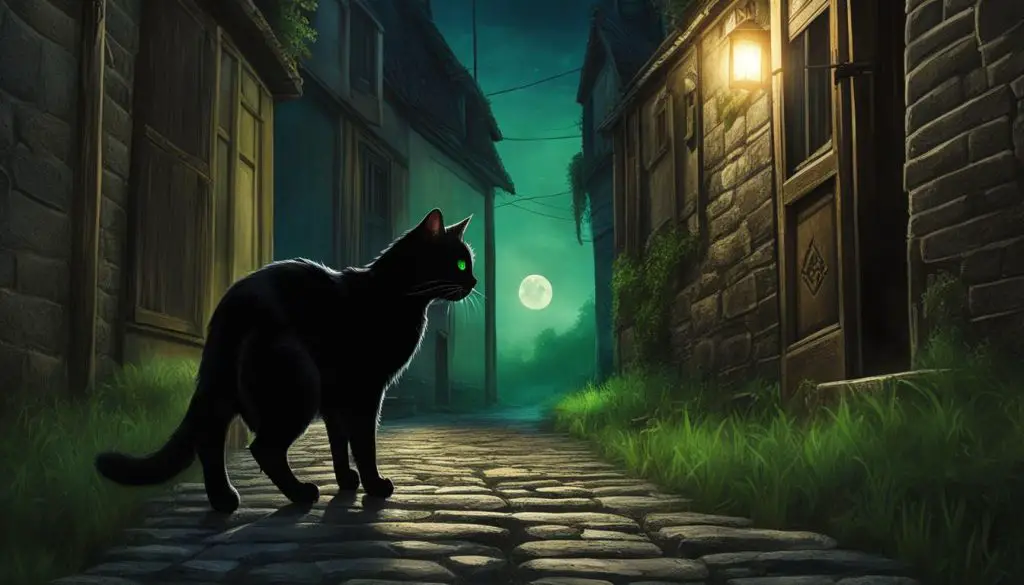
In addition to their unjust blame for the plague, black cats also became linked to witchcraft during this period. The fear and superstition surrounding black cats and their association with witchcraft eventually made their way to America through Puritan colonists, further perpetuating negative beliefs about these innocent animals.
While the plague has long been eradicated, the superstitions surrounding black cats as harbingers of misfortune still persist in some cultures today. However, it is essential to recognize that these beliefs are rooted in unfounded fears and misinformation.
Black Cat Superstitions
Black cats have long been the subject of various superstitions across different cultures. While some perceive them as harbingers of bad luck, others associate them with good fortune and prosperity.
In Scotland, the arrival of a black cat at your home is believed to bring prosperity and wealth. It is seen as a positive omen, signifying future abundance and success.
British sailors also welcomed black cats aboard their ships, considering them to be bringers of good luck and a safeguard against storms and accidents during their voyages.
Japanese superstition suggests that owning a black cat can positively impact your love life. Having a black cat as a pet is believed to attract suitors and spice up romantic relationships. This belief reflects the association of black cats with love, affection, and overall happiness.
“Owning a black cat can attract suitors and spice up your love life.”
It is important to note that different cultures have different beliefs and interpretations regarding black cat superstitions. While some view black cats as benevolent creatures, others associate them with witchcraft and evil. These contrasting beliefs highlight the rich diversity of cultural traditions and the power of superstitions in shaping people’s perceptions and behaviors.
| Country/Culture | Superstition |
|---|---|
| Scotland | A black cat arriving at your home brings prosperity. |
| Britain | Black cats on ships are believed to ensure a safe return. |
| Japan | Owning a black cat can enhance your love life. |
These superstitions surrounding black cats highlight human beliefs’ fascinating and complex nature. Whether you perceive a black cat crossing your path as a symbol of good luck or a harbinger of misfortune, it is a testament to the deep-rooted influence that superstitions continue to have in our lives.
Also read: Is it Good Luck to See a White Cat?
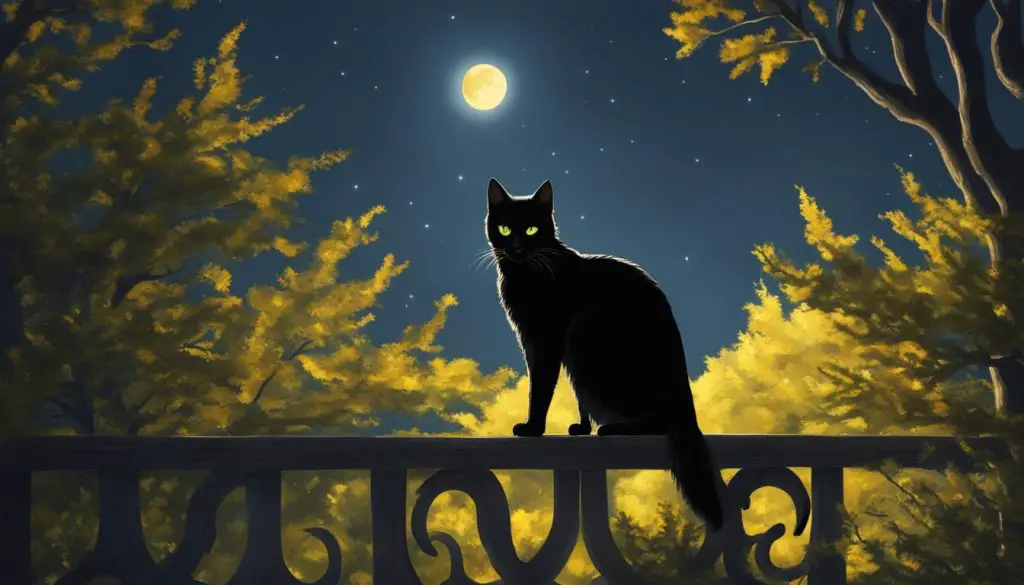
As fascinating creatures, black cats come in various breeds with distinct characteristics. From the British Shorthair to the Cornish Rex, these feline companions offer diverse traits and temperaments. Here are some interesting black cat breeds:
| Breed | Origin | Traits |
|---|---|---|
| British Shorthair | England | Friendly, Patience |
| Cornish Rex | United Kingdom | Curly coat, Energetic |
| Japanese Bobtail | Japan | Playful, Intelligent |
| Maine Coon | United States | Large size, Gentle |
Black cats with tabby stripe genes can undergo a fascinating coat color change when exposed to sunlight. Their black coats can transform into a deep brown hue, showcasing the incredible influence of their genetic makeup.
Moreover, some black cats possess genes that make them more resistant to diseases, similar to specific human genes, providing resilience against many illnesses. This remarkable attribute adds to these enchanting creatures’ allure, making them visually captivating and formidable in their health.
When it comes to black cats, their intriguing nature goes beyond superstition and folklore. Explore the diverse breeds and unique characteristics of these captivating feline companions, appreciating their coat color changes and enhanced disease resistance.
Conclusion
The belief in whether a black cat crossing your path is good or bad luck varies across cultures and regions. While some view it as a bad omen, others see it as a symbol of luck and prosperity. Superstitions and beliefs surrounding black cats have evolved throughout history, influenced by mythology, religion, and cultural traditions.
Throughout various civilizations, black cats have been both revered and feared. In ancient Egypt, they were associated with evil, while in Greece, they were seen as divine symbols. The connection between black cats and witches emerged in medieval Europe, leading to superstitions that persist today.
Whether a black cat brings you luck or misfortune may depend on the lore and beliefs you embrace. So the next time a black cat crosses your path, remember that its significance is shaped by centuries-old superstitions and the cultural context of where you find yourself.
Also read other articles regarding animals good luck.
FAQs
Is it true that black cats are considered bad luck in some cultures?
Yes, Egyptians believed black cats were evil creatures, and in India, crossing paths with a black cat is considered bad luck due to its association with Lord Shani.
Are black cats seen as lucky in any culture?
Yes, encountering a black cat in Britain, Germany, Ireland, and Japan is seen as lucky.
Why are black cats associated with Halloween and witchcraft?
In Western countries, including America, black cats are often seen as symbols of Halloween and witchcraft.
What is the origin of the belief that black cats bring bad luck?
The association between black cats and bad luck originated from ancient civilizations like Egypt, where cats were considered divine symbols. In Greek mythology, the goddess Hecate had a black cat as her familiar. In medieval Europe, the superstition of a black cat crossing your path as a bad omen developed.
Were black cats blamed for spreading the Bubonic plague?
During the Middle Ages, cats were associated with evil and blamed for spreading the Bubonic plague. However, killing cats actually led to a rapid increase in the rat population and the further spread of the disease.
What are some other superstitions and beliefs surrounding black cats?
A black cat arriving at your home is believed to bring prosperity in Scotland. British sailors welcomed black cats aboard ships for good luck, and Japanese superstition suggests that owning a black cat can spice up your love life and attract suitors.
How many breeds of black cats are there?
There are 22 different breeds of black cats with purely black coats, including the British Shorthair, Cornish Rex, Japanese Bobtail, and Maine Coon.
Can the coat color of black cats change?
Black cats with tabby stripe genes can change their coats to a deep brown color when sunlight exposes them.
Do black cats have any unique genetic traits?
Some black cats may have genes that make them more resistant to diseases, similar to specific human genes that resist many diseases.
What is the conclusion about the luck associated with black cats?
Whether a black cat crossing your path brings luck, or misfortune depends on the lore and beliefs you embrace.

